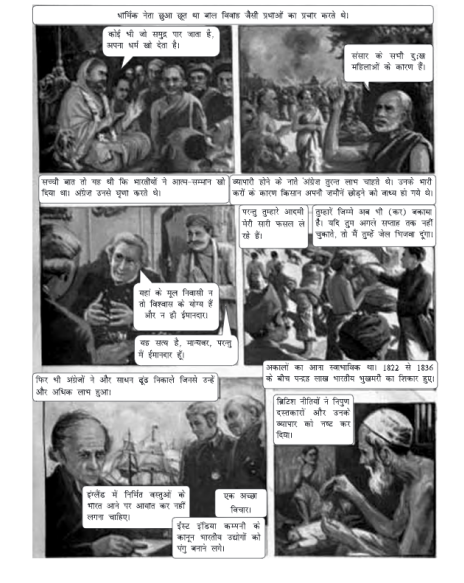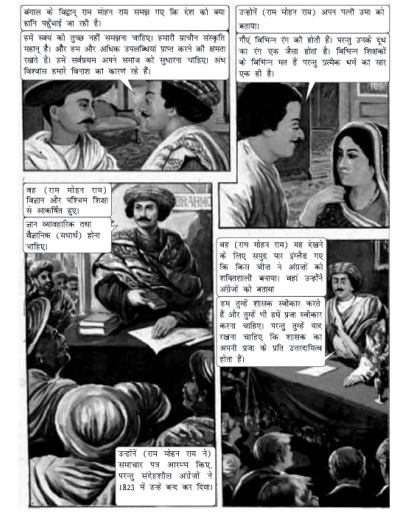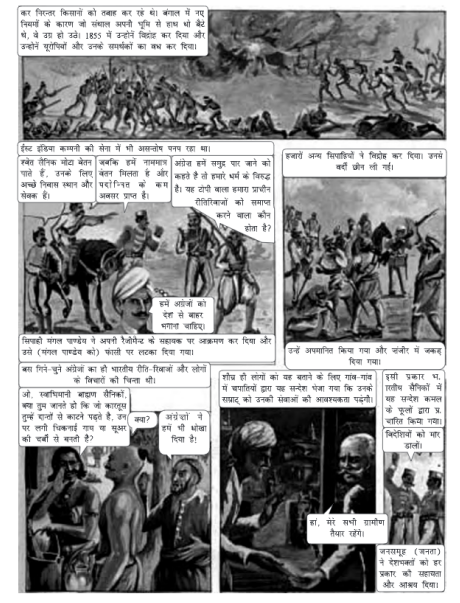KSEEB Solutions for Class 8 English Chapter 3 Glimpses of the Past Summary In English
This chapter tells us about the history of India during the years 1757 to 1857 through pictures. We come to know about the conditions that prepared the ground for the First War of Independence in 1857. A great number of countrymen laid down their lives for the sake of India’s freedom.
The story begins with the arrival and expansion of the British East India Company in India. At that time India was broken into small states ruled by short-sighted princes. Their rivalries helped the British to subdue them. The British were also able to extend their power in India on account of their superior weapons. Thus, we became their slaves. The British rule in India was an oppressive one. Their administrative policies made people poor and unhappy.
They imposed heavy taxes on farmers and small industries and destroyed them. Through foreign trade, they took away a huge sum of money from their country. Fortunately, there emerged social reformers like Ram Mohan Roy, who awakened the Indian masses. The spread of western education in India also changed the outlook of the people. They came to understand the causes behind their misery and suffering.
They revolted against the British rulers. The revolt of 1857 was started by a regiment of soldiers in Meerut. It spread far and wide. The Mughal Emperor Bahadur Shah Zafar was declared the Emperor of India. Almost all the classes of the Indian society joined hands to uproot the British from India.
Rebellions were organized by former rulers like Begum Hazrat Mahal of Lucknow and Maulvi Ahmed- dull of Faizabad, etc. Kanpur. Jhansi and Allahabad became major centers of the armed struggle. Nana Saheb – the leader of the revolt, Tatya Tope, Azimulla Khan, and many others fought bravely. Eighty-year-old Kunwar Singh of Bihar received a bullet in his wrist. He died saying,” Mother Gangal This is my last offering to you.”
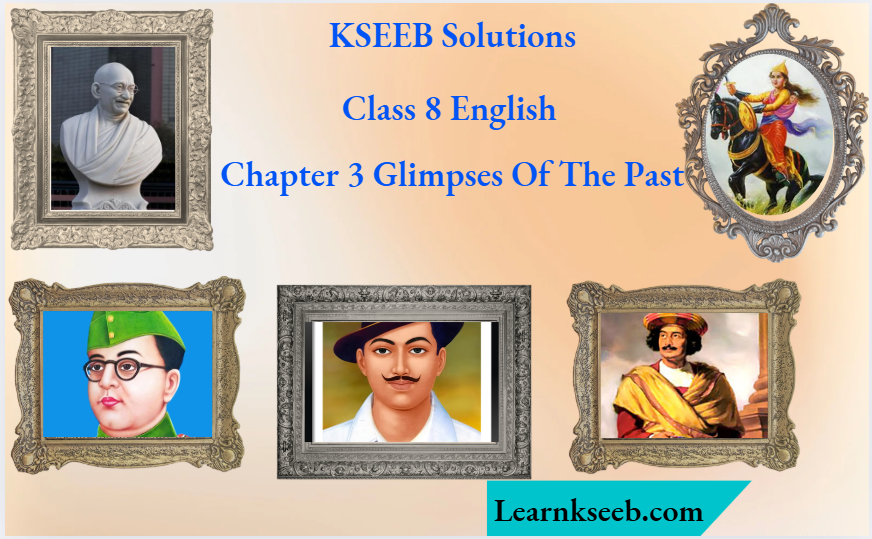
Kseeb Class 8 English Chapter 3 Glimpses Of The Past Solutions Pdf
Glimpses of the past Summary In Hindi
यह पाठ हमें चित्रों के द्वारा 1757 से 1857 तक भारत के इतिहास के बारे में बताता है। हमें उन परिस्थितियों की जानकारी मिलती है जिन्होंने 1857 के प्रथम स्वतंत्रता संग्राम की भूमिका तैयार की। देश वासियों ने बहुत बड़ी संख्या में भारत की स्वतंत्रता के लिए अपना बलिदान दिया।
कहानी ब्रिटिश ईस्ट इंडिया कंपनी के भारत आगमन तथा प्रसार से शुरू होती है। उस समय भारत छोटे-छोटे राज्यों में विभाजित था जिन पर अदूरदर्शी भारतीय शासक राज्य करते थे। उनकी आपसी शत्रुता ने ही उनका दमन करने में अंग्रेजों की सहायता की। अंग्रेज अपने श्रेष्ठ किस्म के शस्त्रों द्वारा भी भारत में अपनी शक्ति बढ़ाने में सफल रहे। इसे प्रकार हम उसके दास बन गए। भारत में अंग्रजी शासन दमनकारी था। उनकी प्रशासनिक नीतियों के कारण लोग निर्धन तथा अप्रसन्न हो गए। भारतीयों पर भारी टैक्स लगा दिए और हमारे कुटीर उद्योगों को नष्ट कर दिया। वे विदेशी व्यापार द्वारा देश का बहुत सा धन अपने देश ले गए।
भाग्यवश राजा राममोहन राम जैसे समाज सुधारकों का उदय हुआ जिन्होंने भारत के प्रसार ने भी भारतीयों का दृष्टिकोण बदला। उन्हें अपने कष्टों एवं दुःखों के कारणों का पता चल गया । इसलिए उन्होंने अंग्रेजी शासन के विरुद्ध विद्रोह कर दिया। 1857 में मेरठ में भारतीय सेना द्वारा शुरू किया गया विद्रोह दूर-दूर तक फैल गया।
दिल्ली के मुगल बादशाह बहादुर शाह को भारत का सम्राट घोषित किया गया। समाज के सभी वर्गों ने अंग्रेजी शासन का अंत करने के लिए हाथ मिलाए। लखनऊ में बेगम हजरत महल, फैजाबाद के मौलवी अहमदुल्ला ने विद्रोहियों को व्यवस्थित करा कानपुर, झांसी और इलाहाबाद भी विद्रोह के बहुत बड़े केन्द्र बन गए। पेशवा नाना साहिब, विद्रोह के नेता, तात्या टोपे अजीमुल्ला खान तथा अन्य सभी वीरतापूर्वक लड़े। बिहार के 80 वर्षीय कुंवर सिंह को बाजू में गोली लगी। उन्होनें इन शब्दों के साथ अपने प्राण त्यागे: ” हे मां गंगे। यह मेरी आपकों अंतिम भेंट है।
Class 8 English KSEEB Chapter 3 Glimpses Of The Past Summary
Glimpses Of The Past Hindi Translation Of The Lesson
Here are some pictorial glimpses of the history of our country from 1757 to 1857. These pictures and ‘speech bubbles’ will help clarify your understanding of the conditions that led to the event known as the First War of independence in 1857.
यहां 1757 से 1857 तक के हमारे इतिहास की कुछ सचित्र झलकियां दी गईं हैं। ये चित्र और संवाद आपको वे स्थितियां स्पष्ट कर देंगे जो 1857 के प्रथम स्वतन्त्रता संग्राम का कारण बनीं।
- The Martyrs
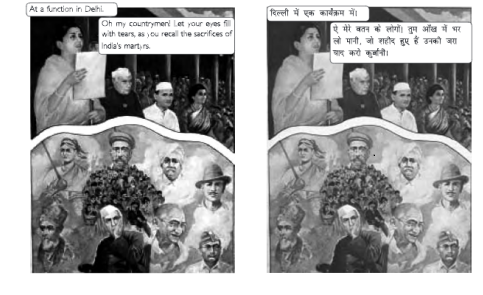
Sslc Class 8 English Glimpses Of The Past Question And Answers
Word Meanings
countrymen – men who live in a country, देशवासी
recall-call to mind,
sacrifices – loss of lives, for
martyr – one who voluntarily suffers death for a cause, शहीद
2. The Company Conquests (1757-1849)
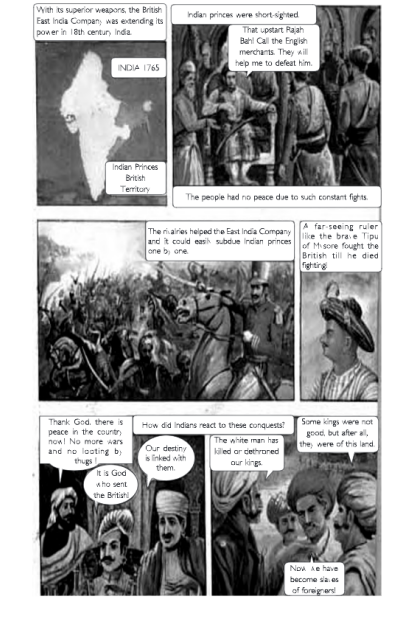

Kseeb Class 8 English Glimpses Of The Past Textbook Solutions
Word Meanings
superior- of high quality,
extending – stretch out over a distance, farar
constant – continuing for an indefinitely long time, लगातार
rivalries – enmity,
subdue-put down by force & authority, दबाना
thugs-young criminals, get
slaves – prisoners, Jell
3. British Rule (1765-1836)

Word Meanings
misery – a feeling of intense unhappiness, दुःख, दर्द
arrears – unpaid overdue debt,
abandon – to leave,
cripple – cause destruction,
artisans – workers skilled in trade related to textiles, painted ceramics, etc,
scorned-to abuse,
4. Ram Mohan Roy (1772-1833)
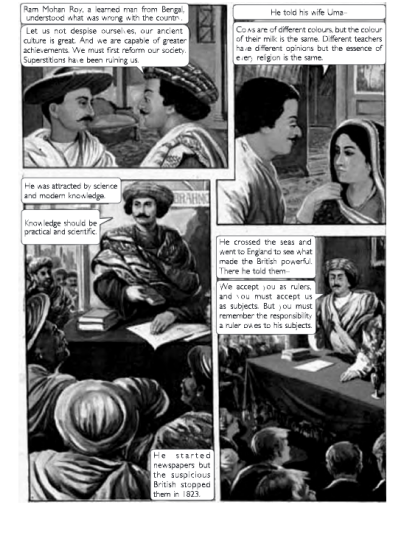
Glimpses Of The Past Class 8 English Kseeb Important Questions
Word Meanings
learned-knowledgeable, feren
despise – feel contempt,
essence – main teaching,
reform – bring changes in institutions or practice, क्रांति
5. Oppression (1765-1835)

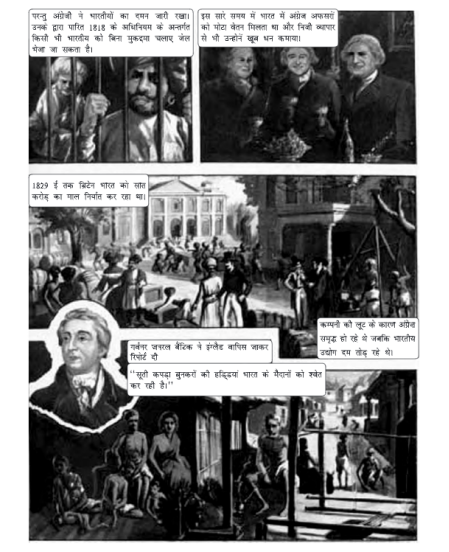
Karnataka Sslc Class 8 English Chapter 3 Solutions In English
Word Meanings
oppression – to put undue pressure,
trial-case,
weaver-person who weaves fabric, em
6. Dissatisfaction (1835-56)
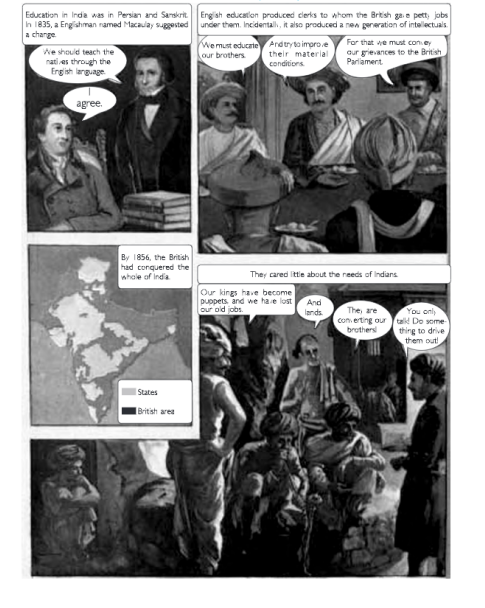
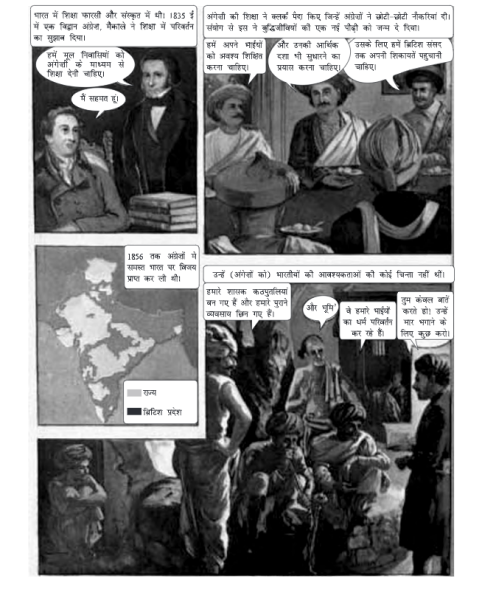
Kseeb Class 8 English Glimpses Of The Past Solved Exercises
Word Meanings
natives- people born in a specified place, निवासी
grievances – feeling of resentment,
puppets – under the control of another, कठपुतली
conquered-won over,
7. The Sparks (1855-57)
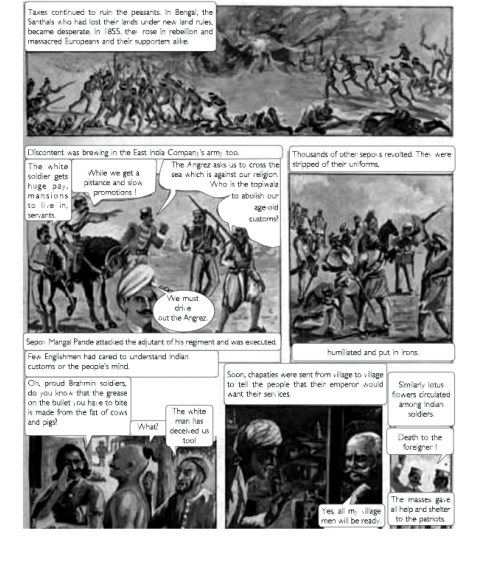
Class 8 English Glimpses Of The Past Notes Karnataka Board
Word Meanings
rebellion-to oppose. fast
massacred – brutally killed,
abolish – to remove completely,
pittance – a very small amount of money, नाममात्रको
circulated-distributed,
deceived-cheated, uten
8. Revolt (1857)
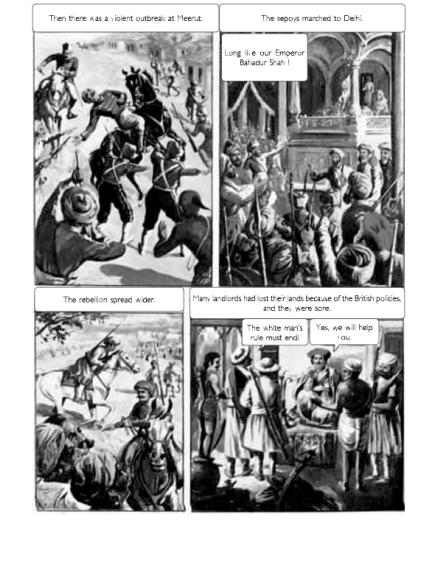
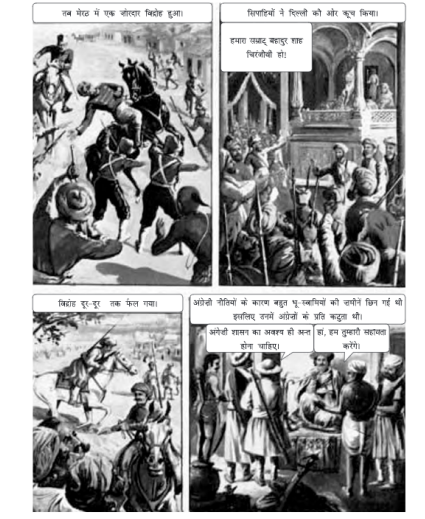
Glimpses Of The Past Class 8 English Summary And Explanation Kseeb
Word Meanings
violent – involving physical force, for
sepoys – soldiers, fuerunt
sore-angry,
9. The Fight for Freedom (1857)
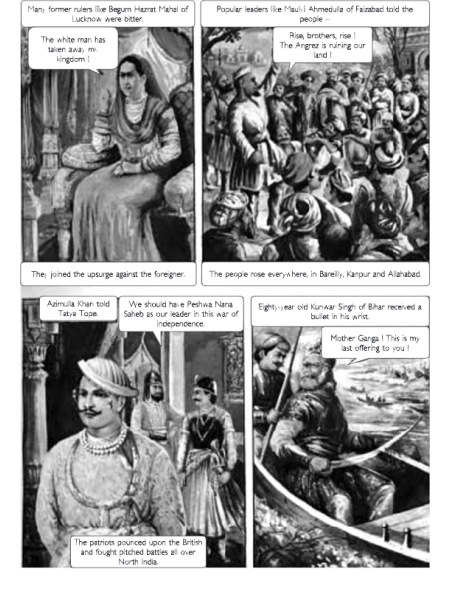
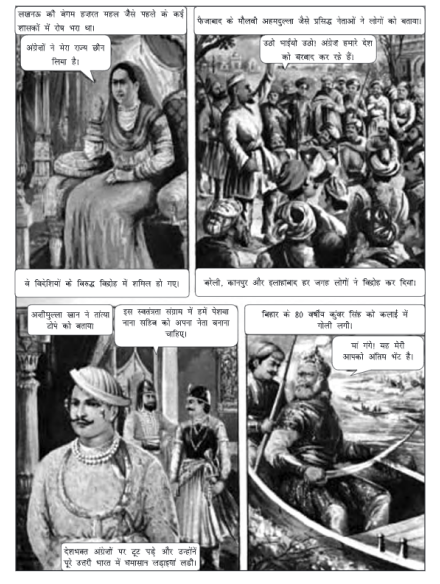
Word Meanings
upsurge – (here) a rapid or abrupt rise of rebels,
bitter- unhappy,
pitched – substantial, ate
pounced-attacked,
KSEEB Class 8 English Reader Solutions For Glimpses Of The Past
Glimpses of the past Textbook Exercises (Solved)
Working With The Text
Answer the following questions.
- Do you think the Indian princes were short-sighted in their approach to the events of 1757?
Answer. Yes, the Indian princes were short-sighted in their approach to the events of 1757. They fought among themselves. They failed to understand that they were becoming weaker. - How did the East India Company subdue the Indian princes?
Answer. The rivalries among the Indian princes helped the East India Company to subdue them easily. Indian princes fought with one another. The people had no peace due to their constant fights. The British took advantage of the situation and subdued the Indian princes one by one. - Quote words used by Raja Ram Mohan Roy to say that every religion teaches the same principles.
Answer. “Cows are of different colors. But the color of their milk is the same. Different teachers have different opinions but the essence of every religion is the same.” - In what way did the British officers exploit Indians?
Answer. The British officers drew huge salaries. They also made fortune in private businesses. This ruined the Indian traders. - Name these people.
The ruler who fought a pitched battle against the British and died fighting.
The person who wanted to reform the society.
The person who recommended the introduction of English education in India.
Two popular leaders who led the revolt. (Choices may vary.)Answer
Tipu Sultan
Raja Ram Mohan Roy
Macaulay
(a) Bahadur Shah Zafar
(b) Nana Sahib
Sslc Class 8 English Chapter 3 Workbook Answers
Glimpses of the past Working With Language
In comics what the characters speak is put in bubbles. This is direct narration. When we report what the characters speak, we use the method of direct narrative on.
Study these examples.
First farmer: Why are your men taking away the entire crop?
Second farmer: Your men have taken away everything.
Officer: You are still in arrears. If you don’t pay tax next week, I’ll send you to jail.
• The first farmer asked the officer why his men were taking away the entire crop.
• The second farmer said that his men had taken away everything.
• The officer replied that they were still in arrears and warned them that if they did not pay tax the following week he (the officer) would send: them (the farmers) to jail.
I. Change the following sentences into indirect speech.
- First man: We must educate our brothers.
Second man: And try to improve their material conditions.
Third man: for that, we must convey our grievances to the British Parliament
The first man said that_______________________________
The second man added that_________________________
The third man suggested that_________________________ - First soldier: the white soldier gets huge pay, mansions, and servants.
Second soldier: we get a pittance and slow promotions.
Third soldier: who are the British to abolish our customs?
The first soldier said that___________________________________
The second soldier remarked that__________________________
The third soldier asked______________________________________
Answer.
- they must educate their brothers.
they must try to improve their material condition.
for that, they must convey their grievances to the British Parliament. - the white soldiers got huge pay, mansions, and servants,
they got a pittance and slow promotions,
who the British were to abolish their customs.
Glimpses Of the Past Class 8 KSEEB Questions And Answers
Glimpses of the past Speaking And Writing
1. Play-act the role of farmers who have grievances against the policies of the government. Rewrite their speech bubbles’ in dialogue form first.
First farmer: Britishers have taken away all my crops.
Second farmer: It is a shame that we pay such heavy taxes.
Third farmer: There is famine year after year. All our crops are dead. How will we pay them? Fourth
farmer: They say I am still in arrears. If I don’t pay next week, they will send me to jail.
Note. Write the dialogue in ‘speech bubbles and then enact the’
2. Look at the pictures.
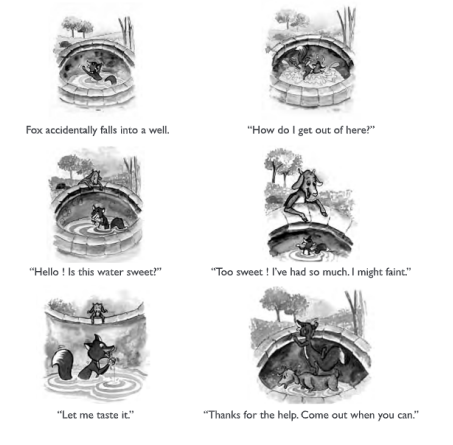
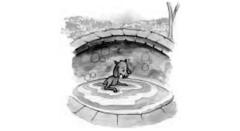
My mother used to say: “Be careful how you take the advice of people you don’t know.”
(1) Ask one another questions about the picture.

All the answers to these questions have been given in the following story
Kseeb Class 8 English Glimpses Of The Past Mcqs With Answers
(2) Write the story in your own words. Give it a title.
Answer. The Fox and the Goat A fox went to a well to drink water. Accidently, he fell into it. He tried to get out but was not successful. In the meantime, a goat came there. She saw the fox inside the well. She asked him how all that had happened. The fox was very cunning. He told the goat that he was enjoying the water The goat asked him if the water was sweet The fox very smartly replied that it was the sweetest water he had ever tasted. The goat said, “Let me taste it too.” He asked her to bend down. When the goat bent down, the fox hung on to the goat and came out of the water and the goat fell in. He went away saying, “Now enjoy the sweet water.” The story teaches us that we should be aware of cunning people.
3. Read the following news item.
History becomes fun at this school
Mumbai: Students in the sixth grade of a certain school in Navi Mumbai love their history lessons thanks to a novel teaching aid. It is not surprising given the fact that their study material includes comic books and they use their textbooks for reference to put things into perspective. Besides, students are encouraged to tap other sources of information as well. During history classes, students pore over comic strips of historical periods, enact characters of emperors and tyrants, and have animated discussions on the subject. History has become fun.
In the class students are asked to read the comic strip aloud, after which they break up into groups of four, discuss what they have heard and write a summary-. Each group leader reads his group’s summary’ aloud and the whole class jumps into discussion and debate, adding points, disagreeing, and qualifying points of view. A sixth-grade student says, “It’s a lot of fun because everyone gets a chance to express themselves and the summary’ takes everyone’s ideas into account.”
According to the school principal, the comic strip format and visuals appeal to students. A historian feels that using comics in schools is a great idea Comics and acting help students understand what characters in the story are actually thinking. (adapted from The Times of India, New Delhi, October 2007)
Based on this news item, write a paragraph on what you think about this new method of teaching history.
Answer. This method of teaching history is really very interesting and appealing. Students enjoy reading comics. So they understand the facts easily. Visuals make a permanent orint on their minds. Besides, playacting helps them to know the nature and thoughts of the historical personalities.
Explanation Of Glimpses Of The Past KSEEB Class 8
Glimpses Of The Past Extract Based Questions
Read the extracts given below and answer the questions that follow.
1. With its superior weapons, the British cast India company was extending its power in 18th-century India. Indian princesses were short-sighted.
That upstart Raja Bah! Call the English merchants. They will help me to defeat him.
The people had no peace due to such constant fights.
The rivalries helped the East India Company and it could easily subdue Indian princes one by one.
- What were the superior weapons?
- Why were Indian princes called short-sighted?
- Who fought among themselves?
- What helped the East India Company?
- What did the company do?Answer.
- The superior weapons were guns.
- Indian princes were unable to understand the consequences of their actions.
- Indian princes fought among themselves.
- Rivalries among princes helped the East India Company.
- The company captured the Indian states are by one
2.”Let us not despise ourselves our, ancient culture is great. And we are capable of greater achievements. We must first reform our society. Superstitious have been ruining us.” He told his wife Uma-“Cows are of different colors, but the color of their milk is the same.” Different teachers have different opinions but the essence of every religion is the same. He was attracted by science and modem knowledge. “Knowledge should be practical and scientific.”
- Who speaks the opening lines?
- Who are capable of greater achievements?
- What is the essence of every religion?
- How should be the knowledge?
- What attracted the speaker?Answer.
- Raja Ram Mohan Roy speaks the opening lines.
- Indians are capable of greater achievements.
- Every religion teaches us to be tolerant towards each other.
- Knowledge should be practical and scientific.
- Science and modem knowledge attracted the speaker.
Class 8 Kseeb English Theme And Message Of Glimpses Of The Past
3. Taxes continued to ruin the peasants. In Bengal, the Santhals who had lost their lands under new land rules became desperate. In 1855, they rose to rebellion and massacred Europeans and their supporters alike. Discontent was brewing in the East India company’s army too. “The whole soldier gets huge pay, mansions to live in, servants.” “While we get a pittance and slow promotions”
- What ruined the peasants?
- Who lost their lands under new land rules?
- When did they rise to rebellion?
- What did they do?
- Who else was discontented?Answer.
- Taxes ruined the peasants.
- Santhals lost their lands under new land rules.
- They rose to rebellion in 1855.
- They massacred Europeans and their supporters alike.
- East India company’s army was discontented.
Glimpses Of The Past Very Short Answer Questiona
- What made the Indian princes weak?
Answer. Their short-sightedness and mutual rivalries made the Indian princes weak - What made the Indian people poor and unhappy under the British rule? Give one reason.
Answer. The wrong administrative policies of the British made the Indian people poor and unhappy. - Who was Ram Mohan Roy?
Answer. Ram Mohan Roy was a great social reformer who awakened the Indian masses. - What were the last words of Kunwar Singh of Bihar?
Answer. His last words were: “Mother Ganga! This is my last offering to you.”
Short Answer Type Questions
- What role did Western Education play in preparing people for the revolt of 1857?
Answer. The spread of Western Education in India changed the outlook of the people. They came to understand the causes behind their misery and suffering. They revolted against the British rulers in 1857. - How did the wrong policies of the British rule cause discontent among the Indians?
Answer. The British rule in India was an oppressive one. Their administrative policies made the people poor and unhappy. They imposed heavy taxes on the Indians and destroyed the cottage. industries. Through foreign trade, they took away a huge sum of money to their country. All this
caused discontent among Indians.
Glimpses Of The Past Long Answer Type Questions
From where did the Revolt of 1857 start? How did it spread all over India?
Answer. The Revolt of 1857 started in Meerut led by the sepoys of East Indian Company. Soon it spread far and wide. The Mughal Emperor Bahadur Shah Zafar was declared the Emperor of India. Almost all the classes of the Indian society- joined hands with the Indian sepoys for the revolt Former rulers like Begum Hazrat Mahal of Lucknow, Maulvi Ahmedulla of Faizabad, and Tipu Sultan of Mysore played an important role in the armed struggle against the British. Kanpur, Jhansi, and Allahabad became the main centers of the revolt. The patriots pounced upon the British and fought bravely against them.
Macavity-The Mystery Cat Summary In English
The poem deals with a master criminal whom the poet calls Macavity, the mystery cat. He is also called the Hidden Paw.
The poet says that he defies law again and again, but he is never caught. When the Flying Squad reaches the scene of a crime, Macavity is not there. He always leaves the Scotland Yard puzzled. In committing crimes no one is like Macavity. He has broken almost every human law. He breaks the laws of nature too. He breaks the law of gravity. He has extraordinary power to float in the air without any support. But he is always beyond the reach of the police.
Macavity is tall and thin. One can recognise him by his physical features. His eyes are sunken in and his head is highly domed. He sways his head from side to side like a snake. His coat is dusty and his whiskers are uncombed. He is a devil in the shape of a cat. He is morally corrupt. You may meet and see him everywhere. But whenever some crime of his is discovered, he is not there.
Macavity-The Mystery Cat Summary In Hindi
यह कविता एक शातिर अपराधी से संबंधित है जिसे कवि Macavity नामक रहस्यमयी बिल्ला कहता है। वह छिपा पंजा भी कहलाता है।
कवि कहता है कि वह बार-बार कानून का उलंघन करता है परन्तु कभी पकड़ा नहीं जाता। जब उड़नदस्ता अपराध के घटना स्थल पर पहुंचता है, Macavity वहां नहीं होता। इसलिए लंदन पुलिस बल उलझन में है। जुर्म करने में Macavity की बराबरी कोई नहीं कर सकता। उसने सारे मानव निर्मित कानून तोड़ दिए है। उसने प्रकृति के सिद्धान्त को भी तोड़ दिया है। उदाहरणस्वरूप गुरुत्वाकर्षण का सिद्धान्त। उसमें बिना किसी सहारे के वायु में तैरने की असाधारण शक्ति है। परन्तु वह सदा पुलिस की पहुंच से बाहर है।
Macavity लम्बा पतला है। कोई भी उसे उसकी शारीरिक बनावट से पहचान सकता है। उसकी आंखें अन्दर धंसी हुई है और सिर गुम्बद जैसा है। वह अपने सिर को सांप की भान्ति इधर-इधर हिलाता है। उसकी खाल गंदी और मूंछे अस्त-व्यस्त हैं। इस शैतान की आकृति बिल्ले जैसी है। वह नैतिक रूप से भ्रष्ट है। आप उसे कभी भी कहीं भी मिल सकते हैं, परन्तु जब कभी उसके किसी अपराध का पता चलता है, वह अपराध स्थल पर नहीं होता।
Class 8 English Kseeb Glimpses Of The Past Short And Long Answer Questions
Macavity-The Mystery Cat Hindi Translation Of The Lesson (With Word Meanings)
Do you have a pet cat? Have you ever noticed anything mysterious about it? It is not easy to say whether every cat is a mystery, but Macavity is one, for sure. What is that makes him a perfect mystery cat? Read the poem and find out.
क्या आपके पास एक पालतु बिल्ली है। क्या तुमने उसके बारे में कुछ रहस्यमयी महसूस करा है। यह कहना आसान नहीं है कि हर बिल्ली रहस्यमयी होती है। परन्तु Macavity है। ऐसा क्या है जो उसे एक पूर्ण रहस्यमयी बिल्ला बनाता है। कविता पढ़िए और जानिए।
1. Macavity’s a Mystery Cat: he’s called the Hidden Paw
For he’s the master criminal who can defy the Law. He’s the bafflement of Scotland Yard, the Flying Squad’s despair: For when they reach the scene of the crime- Macavity’s not there!
Macavity एक रहस्यमयी बिल्ली है जो छुपा हुआ पंजा भी कहलाती है।
वह एक शातिर अपराधी है जो कानून को धोखा दे सकता है। Scotland Yard की पुलिस को उसने असमंजस में डाला है और Flying Squad निराश है। क्योंकि जब भी वह घटना स्थल पर पहुँचते है Macavity गायब हो जाता है
Word Meanings
paw- claved foot, पंजा
despair- a state in which all hope is lost, निराशा
defy- disobey, उल्लंघन करना
bafflement confusion, उलझन
mystery – something that is impossible to understand, रहस्यमय
2. Macavity, Macavity, there is no one like Macavity, He’s broken every human law, he breaks the law of gravity. His powers of levitation would make a fakir stare, And when you reach the scene of the crime – Macavity’s not there You may seek him in the basement, you may look up in the air But I tell you once and once again, Macavity’s not there
Macavity जैसा कोई नहीं है। उसने सभी मानवीय कानून भंग कर दिए है। वह गुत्वाकर्षण का नियम भी तोड़ देता है। उसमें बिना सहारे हवा में उड़ने की इतनी शक्ति है कि कोई फकीर उसे देखता रह जाता है। परंतु जब भी कोई अपराध स्थल पर पहुंचता है, Macavity वहां नहीं मिलता। तुम उसे तहखाने में ढूंढ सकते हो, तुम उसे हवा में देख सकते हो, परंतु मैं तुम्हें एक बार फिर यह बता देता हूँ कि Macavity यहां नहीं मिलेगा।
Word Meanings
gravity-attraction of the earth’s center, गुरुत्वाकर्षण
levitation – floating in the air without support, बिना सहारे हवा में उड़ना
stare gaze, ध्यान से देखना
basement underground place, तहखाना
3. Macavity’s a ginger cat, he’s very tall and thin; You would know him if you saw him, for his eyes are sunken in. His brow is deeply lined with thought, his head is highly domed; His coat is dusty from neglect, his whiskers are uncombed. He sways his head from side to side, with movements like a snake; And when you think he’s half asleep, he’s always wide awake.
Macavity बहुत ही मक्कार (पूर्त) बिल्ला है वह बहुत ही लम्बा तथा पतला है तुम उसे देखते ही पहचान जाओगे क्योंकि उसकी आखें अंदर की ओर घंसी हुई है। उसकी भौंहे विचारों में डूबे रहने के कारण तनी हुई है और उसका सिर पूरी तरह गुम्बदाकार है। उसका कोट (खाल) उसकी लापरवाही के कारण धूल से भरा रहता है। उसकी मूंछे उलझी हुई है, वह अपना सिर सांप की तरह इधर-उधर झुलाता रहता है और जब आप ये सोचते है कि वह आधी नींद सोया हुआ है वह हमेशा पूरी तरह सजग होता है।
Word Meanings
domed-shaped like a dome,
ginger cat – a brown-colored cat, होने का रूपक
sunken – deep set, ter
sway – to move, a
4. Macavity, Macavity, there’s no one like Macavity, For he’s a fiend in feline shape, a monster of depravity. You may meet him in a by-street, you may see him in the square- But when a crime’s discovered, then Macavity’s not there!
Macavity जैसा कोई नहीं क्योंकि यह बिल्ली रूपी शैतान है तथा अनैतिकता रूपी राक्षस है वह आपकों छोटी सी गली में मिल सकता है। वह तुम्हें चौंक पर दिखाई दे सकता है। परंतु जब कोई अपराध सामने आता है, तो Macavity, हाथ नहीं आता।
Word Meanings
fiend devil, शैतान
depravity-moral corruption,
square – crossing, t
feline- cat like, facetten
monster- devil, टौतान, राक्षस
Analysis Of Glimpses Of The Past KSEEB English Reader
Macavity-The Mystery Cat Textbook Exercises (Solved)
- Working With The Poem
Read the first stanza and think.Is Macavity a cat really?
If not, who can Macavity be?
Answer.No, Macavity is not a cat.
Macavity is a notorious criminal. - Complete the following sentences.
(1) A master criminal is one who_____________
(2) The Scotland Yard is baffled because___________________
(3)______________because Macavity moves much faster than them.
Answer.
(1) commits a crime and leaves no sign.
(2) Macavity is not found at the scene of the crime.
(3) The police fail to arrest him - “A cat, I am sure, could walk on a cloud without coming through”. (Jules Verne) Which law is Macavity breaking in light of the comment above?
Answer. Macavity is breaking the law of gravity. - Read stanza 3 and, then, describe Macavity in two or three sentences of your own.
Answer. Macavity is very tall and thin. His head is highly domed and his eyes are sunken. He never combs his whiskers or dusts his coat. He sways his head from side to side like a snake.
- Say ‘False’ or ‘True’ for each of the following statements.
- Macavity is not an ordinary cat.
- Macavity cannot do what a fakir can easily do.
- Macavity has supernatural powers.
- Macavity is well-dressed, smart, and bright
- Macavity is a spy. a trickster and a criminal, all rolled into one.
Answer
- True
- False
- True
- False
- True
- Having read the poem, try to guess whether the poet is fond of cats. If so, why does he call Macavity a fiend and monster?
Answer. Yes, the poet is fond of cats. But he does not like Macavity as he is a big criminal. He dodges the police every time. So, he calls him a fiend and monster. - Has the poet used exaggeration for special effects? Find a few examples of it and read those lines aloud.
Answer. Yes, the poet has used exaggeration for special effects He has tried to show that Macavity has supernatural powers. The following lines support it:
- He breaks the law of gravity.
- His powers of levitation would make a fakir stare.
- You may seek him in the basement you may look up in the air But I tell you once and once again Macavity is not there
Macavity-The Mystery Cat Extract-Based Questions
Read the stanzas given below and answer the questions that follow.
(1) Macavity, Macavity, there is no one like Macavity, He’s broken every human law he breaks the law of gravity. His powers of levitation would make a fakir stare, And when you reach the scene of crime Macavity’s not there! You may seek him in the basement you may look up in the air – But I tell you once and once again, Macavity’s not there
- Who has broken every human law?
Answer. Macavity has broken every human law. - What makes a fakir stare?
Answer. Macavity’s powers of levitation make a fakir stare. - Which law of nature does Macavity break?
Answer. Macavity breaks the law of gravitation. - Can we find Macavity anywhere?
Answer. No, we can’t find it. Macavity’ anywhere. - Write the rhyming words in the stanza.
Answer. Macavity-gravity, stare-there-air’
(2) Macavit/s is a ginger cat, he’s very tall and thin; You would know him if you saw him, for his eyes are sunken in. His brow is deeply lined with thought, his head is highly domed; His coat is dusty from neglect, and his whiskers are uncombed. He sways his head from side to side, with movements like a snake; And when you think he’s half asleep, he’s always wide awake.
- How does Macavity look? Mention two of his physical features.
Answer. Macavity is tall and thin. His eyes are sunken in. - What type of head does he have?
Answer. He has a highly domed head. - How does he sway his head?
Answer. He sways his head the way a snake does. - Why does he look dirty?
Answer. He looks dirty because his coat is dusty and his whiskers are uncombed. - Are we right when we think Macavity is half asleep?
Answer. No, we are not right. He is always wide awake.
Macavity-The Mystery Cat Additional Questions
Very Short Answer Type Questions
- Why does the poet say, ‘there is no one like Macavity’?
Answer. The poet says so because Macavity has broken every human law. - What makes Macavity a master criminal?
Answer. Macavity leaves no signs at the scene of the crime This makes him a master criminal. - What power of Macavity surprises even a fakir?
Answer. His power of levitation surprises even a fakir. - What is the other name of the mystery cat?
Answer. His other name is the Hidden Paw.
Macavity-The Mystery Cat Short Answer Type Questions
- Give the central idea of the poem?
Answer. The poem is based on the theme of crime and law. It is said that law has long hands. No criminal are can escape from them. But it does not apply to Macavity, a master criminal. He breaks the law again and again and leaves no signs. So he remains beyond the reach of the law. - Why is Macavity called a mystery cat?
Answer. Macavity is as clever and as active as a cat He also resembles a cat in his appearance. Besides, crimes committed by him always remain a mystery. Tnat is why Macavity is caJled a mystery cat.
Macavity-The Mystery Cat Long Answer Type Questions
- How does the poet describe Macavity as a master criminal?
Answer. The poem deals with a master criminal whom the poet calls Macavity, the mystery cat. He is also called the Hidden Paw. The poet says that he defies the law again and again, but he s never caught. When the Flying Squad reaches the scene of the crime, Macavity is not there. So Scotland Yard is puzzled. In committing crimes no one is like Macavity. He has broken almost every human law. He also breaks the law of gravity as he has extraordinary powers to float in the air without any support But he is always beyond the reach of the police. - Mention the physical features of Macavity. Does he lead a moral life?
Answer. Macavity is tall and thin. His eyes are sunken in and his head is highly domed. He sways his head from side to side like a snake. His coat is dusty and his whiskers are uncombed. He is a devil who is shaped like a cat. Macavity is morally corrupt, he commits crime after crime without being caught.
KSEEB Solutions for Class 8 English Karnataka State Syllabus
- Chapter 1 The Best Christmas Present in the World
- Chapter 2 The Tsunami
- Chapter 3 Glimpses of the past
- Chapter 4 Bepin Choudhury’s Lapse Of Memory
- Chapter 5 The Summit Within
- Chapter 6 This Is Jody’s Fawn
- Chapter 7 A Visit to Cambridge
- Chapter 8 A Short Monsoon Diary
- Chapter 9 The Great Stone Face 1
- Chapter 9 The Comet-1
- Chapter 10 The Comet-2
KSEEB Class 8 English Supplementary Readers contains Textbook Readers and Supplementary Readers of all chapters are part of Revision Notes for grade 8 English. Here we have given notes Class VIII.

